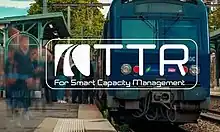 | |
 FTE offices located within SBB Headquarters, Wankdorf, CH | |
| Type | Nonprofit organization, International Organization |
|---|---|
| Industry | Rail Transportation |
| Founded | January 1st 1997 |
| Headquarters | Bern, Switzerland |
| Members | Railway Undertakings and Service Companies |
Number of employees | 8 |
| Website | www |
Forum Train Europe (FTE) is an international organization based in Bern, Switzerland. FTE serves as the primary coordination and exchange platform for Europe's railway undertakings in the area of timetabling and capacity management. The work of FTE and its members is ultimately aimed at promoting increased and improved freight and passenger rail connections in Europe.
History
While FTE in its current form was established in 1997, its history stretches back well over a century, as it is the product of 150 years of timetable conferences.
The first international timetabling conference for passenger traffic (known as CEH/EFK) occurred in Cologne, Germany in 1872.[1] Following this, the first international timetabling conference for freight (CEM/EGK) occurred in Prague, Czechia, in 1923. These timetabling conferences provided a crucial platform for railway companies to meet and plan for international train paths.[1]
In 1991, the European Commission adopted directive 91/440, which began the process of rail liberalization in the EU. This legislation mandated that railway companies, which until then both operated trains and owned and managed railway infrastructure, split those two functions into distinct companies or distinct divisions of the same company.[2][3] This policy change from the European level led to a major restructuring of how railway networks are operated in Europe and necessitated the transformation of the way timetable conferences were organized. In 1996 and 1997, this resulted in the merger of CEH/EFK and CEM/EGK into one organization,[4][5] known from then on as Forum Train Europe and the leave of Infrastructure Managers in 2004 to form an independent organization.[1]
Aims
FTE provides a forum in which European railway undertakings coordinate with each other in the areas of timetabling and capacity management. FTE acts as a think-tank by providing expertise and promoting exchange between its member's professionals and middle managers. Cross-border rail in Europe is characterized by a patchwork of procedures and tools for the running of trains. This is a legacy of the independent development of each European nation's railway network. FTE aims to encourage Europe-wide standardization of these timetabling and capacity management processes and tools. FTE's core business is further made up of the design, harmonization, and agreement of cross-border timetables and train compositions.[6]
Since the early 1990s, the liberalization of Europe's railways has led to the breakup of railway operation and infrastructure management into independent companies.[3] This has led to the current commercial environment of European rail, where the operations and business models of railway undertakings are dependent on the activities of the infrastructure managers. Thus, another core aim of FTE is to represent its member's interests in dealings with infrastructure managers, as well as other European organizations and international authorities.[7]
Working Areas
Coordination Platform
While railway undertakings are often competitors to one another, they must operate on the same infrastructure and under the same timetables and policies. Thus, it is mutually beneficial for railway undertakings to advocate together for their interests. These interests include transparent and standardized processes for capacity planning/allocation, as well as market-oriented and efficient service from infrastructure managers.[8]
FTE carries out its primary function as a coordination platform for European railway undertakings in capacity management and timetabling through various working groups and yearly timetabling conferences.
Timetabling Conferences
FTE organizes multiple coordination conferences a year for both freight and passenger railway undertakings. These conferences coincide with major points in the development of Europe's yearly timetable. At FTE coordination conferences, members bring their concepts on train timetables for the upcoming annual timetable period for trains operated in partnership, and they try to harmonize these timetables and operation concepts. These concepts are then consolidated and used by railway undertakings in their planning for the coming timetable.[6] FTE timetabling conferences are often held in Ljubljana, Slovenia.
There are three conferences per year for passenger railway undertakings. Coordination conference FTE A takes place in January and addresses the preparation of path study requests. FTE B, held at the end of March/beginning of April handles the finalization of path requests. Lastly, FTE C/D is held in July and covers a range of topics, including the fine-tuning of deployment of coaches and wagons, validation of the draft timetable, preparation and harmonizing of late path requests, and consultation of measures regarding construction works with international impact.[9]
Freight railway undertaking participate in coordination conference FTE B as well as FTE D, which takes place at the beginning of July and covers the validation of the draft timetable and phrasing of observations.[9]
Working Groups
Outside of timetabling conferences, FTE members coordinate with each other and the railway sector through various working groups,[10] organized by FTE. Different to the conferences, these groups deal with improvements of the capacity management processes and related tools. These working groups (WG) include for instance FTE WG Passenger and FTE WG Freight for business topics, FTE WG IT for IT related topics and RU Ambassador Group for coordination and communication issues.
The main topics of FTE focus are:
- Temporary capacity restrictions
- RU input for the advance infrastructure/capacity planning
- Improvements in the annual and after annual timetabling
- Allocation rules for capacity shortage
- Integration of rail service facilities into capacity planning/allocation
- User-orientation of capacity related IT systems
FTE has also established few groups jointly with Rail Net Europe,[11] an organization which represents infrastructure managers (IMs). In these groups the IMs and FTE members exchange views on the different business and IT topics and try to shape balanced sector orientated solutions.
Timetable Redesign (TTR)

Timetabling and Capacity Redesign for Smart Capacity Management (TTR) is a sector-led overhaul of the current timetabling process in Europe. TTR was initiated by Forum Train Europe in 2014 and is now managed together with RNE and with support from the European Freight Rail Association (ERFA).[12][13] TTR has also gained interest and support from the European Union.
The current timetabling process, created in the previous century, is characterized by a lack of harmonization of the procedures used between European countries.[12] The current timetabling procedure has been identified by the railway sector and the European Commission as in part contributing to the inflexibility, inefficiency, and ineffectiveness of the rail sector in Europe today, especially for freight and cross-border rail travel. Additionally, as Europe's rail sector has liberalized, timetabling and capacity management processes no longer reflect market-needs.[14][15]
As co-developer of TTR alongside Rail Net Europe, the interests of railway undertakings are represented in the recreation of the timetabling and capacity management process. The aim of this approach is to ensure a sector-wide solution to timetabling and capacity management, rather than one which favors infrastructure managers or railway undertakings over the other.
While some limited aspects of TTR are already in place, the implementation is expected from timetable year 2025.
IT Co-development
FTE serves as a business advisor and co-developer of European capacity management IT systems of Infrastructure Managers. FTE members gather and discuss their functional requirements for IT within the group. The requirements are afterwards consolidated and provided to Rail Net Europe.[4]
Members
.jpg.webp)




Passenger
As of January 2023.[16]
.jpg.webp)

Freight
.jpg.webp)

As of January 2023.[17]
| Railway Undertaking |
|---|
| BDZ Cargo |
| BLS Cargo |
| Bulgarian Railway Company (BRC) |
| Captrain Italia |
| CFL Cargo |
| Crossrail Benelux |
| ČD Cargo |
| DB Cargo Belgium |
| DB Cargo Bulgaria |
| DB Cargo Deutscheland |
| DB Cargo France |
| DB Cargo Italia |
| DB Cargo Nederland |
| DB Cargo Polska |
| DB Cargo Romania |
| DB Cargo Scandinavia |
| DB Cargo Switzerland |
| Fret SNCF |
| Green Cargo |
| GYSEV Cargo |
| Hellenic Train Cargo |
| Hupac Intermodal |
| HŽ Cargo |
| LINEAS |
| LTE Logistik |
| Mercitalia Rail |
| Metrans Danubia |
| Montecargo |
| PEARL S.A. |
| PKP Cargo |
| Rail Cargo Austria |
| Rail Cargo Hungary |
| RENFE Mercanias |
| SBB Cargo |
| SBB Cargo International |
| Grup Feroviar Roman (GFR) |
| SIBELIT |
| SŽ Cargo |
| Serbia Cargo |
| Turkish Railways (TDCC) |
| Train Hungary |
| TXLogistik |
| Unicom |
| ŽS Cargo |
| ŽRSM Transport |
See also
References
- 1 2 3 Soldini, Matteo (2022). "Trains Across Borders" (PDF). Forum Train Europe.
- ↑ "Council Directive 91/440/EEC of 29 July 1991 on the development of the Community's railways". European Union.
- 1 2 Dyrhauge, Helene (2013), "Towards Market Opening 1992–2007", EU Railway Policy-Making, London: Palgrave Macmillan UK, pp. 53–71, doi:10.1057/9781137274496_4, ISBN 978-1-349-44571-4, retrieved 2022-12-16
- 1 2 "Forum Train Europe". Railway Gazette International. Retrieved 2022-12-16.
- ↑ "European Passenger Train Timetable Conference | UIA Yearbook Profile | Union of International Associations". uia.org. Retrieved 2022-12-16.
- 1 2 "Forum Train Europe | UIA Yearbook Profile | Union of International Associations". uia.org. Retrieved 2022-12-16.
- ↑ "Forum Train Europe - Goals & Purpose". Forum Train Europe.
- ↑ "Joint Vision for the Sector on Digital Capacity Management" (PDF). Rail Freight Forward.
- 1 2 "Timetabling Conferences". Forum Train Europe.
- ↑ "Forum Train Europe - Capacity Management Platform". www.forumtraineurope.eu. Retrieved 2023-02-10.
- ↑ "RNE Approach and Structure – RNE". Retrieved 2022-12-16.
- 1 2 "Introduction/Links". Forum Train Europe.
- ↑ "How can the share of rail be increased? The EU commission wants to know". RailTech.com. Retrieved 2022-12-16.
- ↑ "TTR - General Introduction". RailNetEurope.
- ↑ "Digital Capacity Management will free up space on congested EU railways". RailTech.com. Retrieved 2022-12-16.
- ↑ "Passenger Traffic". Forum Train Europe.
- ↑ "Freight Traffic". Forum Train Europe.